Blog
Top Stories
NHLML and IWAI signs MoU for state-of-art Multi-Modal Logistics Park in Varanasi
A significant Memorandum of Understanding (MoU) between National Highways Logistics Management Limited (NHLML) and Inland Waterways Authority of India (IWAI) was signed in the presence of Union Minister of Road Transport and Highways, Shri Nitin Gadkari and Union Minister of Ports, Shipping and Waterways, Shri Sarbananda Sonowal, today.
The MoU is to develop a state-of-the-art Multi-Modal Logistics Park (MMLP) in Varanasi, Uttar Pradesh.
Highlights of MMLP
The 150-acre park is strategically connected to NH7 via a 650m access road and is just 1.5 km from the NH7-NH2 junction. It will seamlessly integrate with the Eastern Dedicated Freight Corridor through a 5.1 km railway line from Jeonathpur Station and National Waterway-1 and is located 30 km from Lal Bahadur Shastri Airport.
The project promises significant investment and employment opportunities, strengthening India’s logistics sector, enhancing trade efficiency, and driving economic growth. This initiative is a testament to India’s commitment to developing its logistics sector and reinforcing its position as a global economic powerhouse.
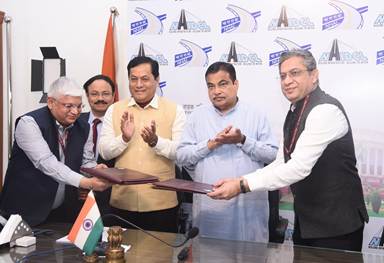
Dr. Jitendra Singh highlights ₹20,000 cr boost for research & innovation, says India Emerging as Global R&D Leader
Dr. Jitendra Singh Highlights ₹20,000 Cr Boost for Research & Innovation, Says India Emerging as Global R&D Leader
India achieved Global Rank 3 in StartUps in last one decade
Union Minister of State (Independent Charge) for Science and Technology; Earth Sciences and Minister of State for PMO, Department of Atomic Energy, Department of Space, Personnel, Public Grievances and Pensions, Dr. Jitendra Singh said that India achieved global Rank 3 in StartUps in last one decade and reaffirmed the Union Government’s commitment to making India a global innovation hub, highlighting the ₹20,000 crore allocation in Budget 2025-26 for the Research, Development, and Innovation initiative.
He explained that the initiative aims to boost research and innovation in the private sector, with a strong focus on expanding efforts in sunrise industries. Speaking at the concluding session of the Post Budget Webinar 2025 on “Investing in Innovation,” he emphasized that this funding would drive cutting-edge research and technological advancements, particularly in deep-tech sectors.
The announcement builds on the ₹1 lakh crore corpus introduced in Budget 2024-25 to accelerate research and development (R&D) in the private sector, with a strong focus on sunrise technologies. Dr. Jitendra Singh underscored that these initiatives would strengthen India’s innovation ecosystem and encourage private sector investments in critical domains like semiconductor manufacturing, artificial intelligence, 5G, and quantum computing.
“India has made significant strides in innovation, with patent grants increasing 17 times since 2014 and our position in the Global Innovation Index rising from 81th to 39th among 133 economies. Today, we rank third globally as a leading contributor to scientific research,” Dr. Jitendra Singh stated.
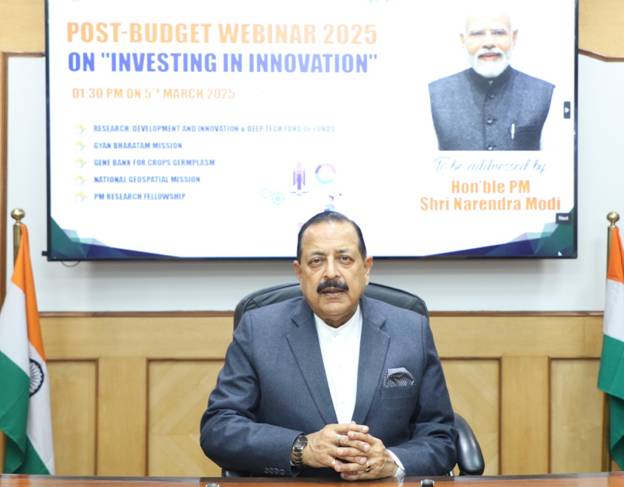
Recognizing the need to nurture world-class research talent, the government has tripled the intake under the Prime Minister’s Research Fellowship (PMRF) Scheme. Originally launched in 2018, the scheme has so far supported 3,688 scholars. The latest Budget expands its reach to 10,000 fellowships over the next five years, offering more opportunities for young scientists to pursue groundbreaking research at India’s premier institutions.
“The PMRF is not just about financial assistance; it is about fostering an ecosystem where academic excellence and intellectual curiosity thrive,” the Minister remarked.
Underscoring the significance of geospatial technology for economic growth and infrastructure planning, Dr. Jitendra Singh highlighted the National Geospatial Mission, an initiative launched under the 2022 National Geospatial Policy. “This mission is critical for India’s transition to a developed nation by 2047,” he said, citing its applications in urban planning, disaster management, and precision agriculture.
India’s agricultural security is also receiving a boost with the establishment of a National Enlarged Gene bank Replica. “India’s National Gene bank is the second largest globally, preserving over 4.7 lakh accessions of 2,147 species, including traditional crops. The new initiative will further safeguard our crop diversity and ensure long-term food security,” Dr. Jitendra Singh explained.
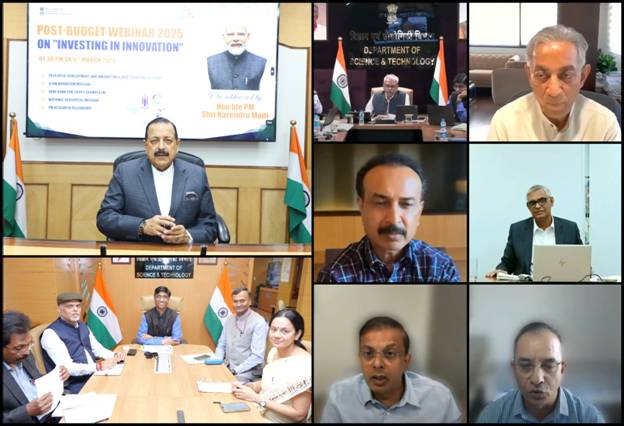
In an ambitious effort to protect India’s vast manuscript heritage, the Gyan Bharatam Mission has been launched to digitize over one crore ancient manuscripts and create a National Digital Repository. “India has an unparalleled intellectual and cultural wealth, much of which is fragile and inaccessible. This initiative will ensure its preservation and accessibility for scholars and researchers worldwide,” the Minister emphasized.
Concluding the session, Dr. Jitendra Singh reiterated that these initiatives align with the government’s broader vision of ‘Viksit Bharat 2047’, a roadmap for India’s transformation into a developed nation. “Investment in innovation is not just about economic growth—it is about empowering young minds, strengthening our technological sovereignty, and securing India’s future on the global stage,” he said.
With bold investments in research fellowships, deep-tech, and digital infrastructure, the government is making a decisive push to position India as a global leader in science and technology.
Union Minister of Commerce & Industry Shri Piyush Goyal emphasises mutual funds industry’s role in India’s growth at AMFI Summit 2025
Union Minister of Commerce & Industry Shri Piyush Goyal emphasises mutual funds industry’s role in India’s growth at AMFI Summit 2025
The mutual funds industry has played a pivotal role in India’s growth story by encouraging financial literacy and taking innovative financial ideas to the industry and the investors. This was stated by Union Minister of Commerce & Industry Shri Piyush Goyal during his address as a Chief Guest at the Association of Mutual Funds in India (AMFI) Mutual Fund Summit 2025 today in Mumbai.
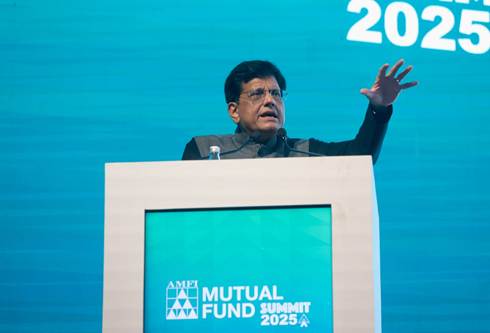
The Minister further complimented the domestic investors for filling the gap created by the foreign institutional investors (FIIs) post-Covid. “Collective investment methods like SIPs along with domestic investors supported the market. They helped in spreading financial awareness and financial products to every part of the country, he said.
Highlighting the importance of safeguarding the importance of small investors and other key stakeholders, Shri Goyal urged the industry leaders to reflect on ways to minimise volatility in the stock market. Large fund inflows, compulsions of the market to deploy capital, fear among investors on missing out on attractive stocks brought crises among investors during rightsizing. There has been a lot of misinformation flow about the unending ability of the market to go on a one-way street, he noted, and described the unpredictability of the stock market as a wakeup call for the industry and its small investors.
AMFI should also become conscious of its duties by isolating misguided investors from the rest. Companies with mettle have maintained reasonable prices at the stock market during recent turbulence, he noted. He said that duties and responsibilities of the industry towards the market are larger than the profitable returns investors enjoy in the short term. He also added that government spending and private capex are showing signs of comeback.
Elaborating on the responsibilities of the mutual funds industry towards its investors, the Minister urged the participants to be more diligent in cautioning investors from taking risks. He hoped that initiatives as such will spur India’s growth story for the next 22 years. Shri Goyal urged the industry to support and handhold investors, look at financial inclusion as a collective responsibility and take up financial education as its duty.
Shri Goyal asserted that assets under management (AUM) in the mutual funds industry at nearly Rs 70 lakh crore and soon to be Rs 100 lakh crore will dominate the market and domestic investors will determine India’s future not the foreign institutional investors. He also highlighted the need for the industry as wealth creators to have a fair and organised market.
India’s competitive advantage in aluminium production offers a silver lining amid US tariff hike
India’s competitive advantage in aluminium production offers a silver lining amid US tariff hike
Bombay Chamber, Mumbai: Effective March 12, 2025, the US intends to eliminate the system of exemptions and quotas on steel and aluminium imports worldwide, reinstating a full 25% tariff on steel, and increasing tariffs on aluminium imports to 25% from 10%. India being a major exporter of aluminium, the US tariff hike is more likely to impact export volumes and realisations for Indian aluminium producers than domestic steel manufacturers.
As per industry estimates, India exported around 40% of its domestic aluminium production in the calendar year 2024 (CY24). The country’s direct aluminium exports to the US are around 6-8% and the sector could see a higher impact from the tariff hike.
“While the impact of tariff hike on aluminium manufacturers is anticipated to surpass steel, India stands to gain from being one of the lowest-cost aluminium producers, owing to the availability of high-quality bauxite reserves,” said Hitesh Avachat, associate director, CareEdge Ratings.
India’s lowest-cost (of aluminium production globally) advantage is mainly on account of the availability of quality bauxite reserves. This improves India’s cost competitiveness in the global market. Industry experts feel this can provide greater cushion to domestic aluminium producers to meet the increased competition from any over-supply scenario arising from the imposition of tariff by the US.
Aluminium production through the primary route remains lower in the US than in the secondary route (scrap route). Thus, the US aluminium industry remains significantly dependent on imports, with around 75% of the US aluminium’s apparent supply (primary + secondary production + imports–exports + adjustments for stock changes; excludes imported scrap) being primarily met through imports. Canada remains the largest exporter of aluminium to the US, followed by UAE and China.
While China remains the largest producer of primary aluminium, holding approximately 60% of the global production share, India ranks as the second largest producer, contributing around 6%. Unlike steel, India is a net exporter of aluminium. The US accounts for about 6-8% of India’s total aluminium exports, representing a larger share of aluminium exports than steel exports.
Commenting on the on impact of US tariff on the Indian aluminium sector, Sehul Bhatt, director – research, Crisil Intelligence, said, the US move to impose a flat 25% tariff on aluminium imports from March 12, 2025, compared with a raft of lower levies now, will have a negative impact on Indian manufacturers of the metal.
“Nearly half of India’s primary production is currently exported, of which around 6% goes to the US. With users of primary aluminium in that country expected to reduce imports after the 25% tariff kicks in, end users there would prefer locally sourced secondary aluminium, or scrap. This, too, will have a bearing on India because around 26% of the aluminium scrap we import comes from the US. Consequently, we foresee some impact on secondary aluminium and alloys producers as well.”
(Write to us at editorial@bombaychamber.com)
Shipbuilding, Indian-flagged vessels offer attractive opportunities, says Piyush Goyal at Bombay Chamber’s international conference on ports, shipping and logistics.
Shipbuilding, Indian-flagged vessels offer attractive opportunities, says Piyush Goyal at Bombay Chamber’s international conference on ports, shipping and logistics.
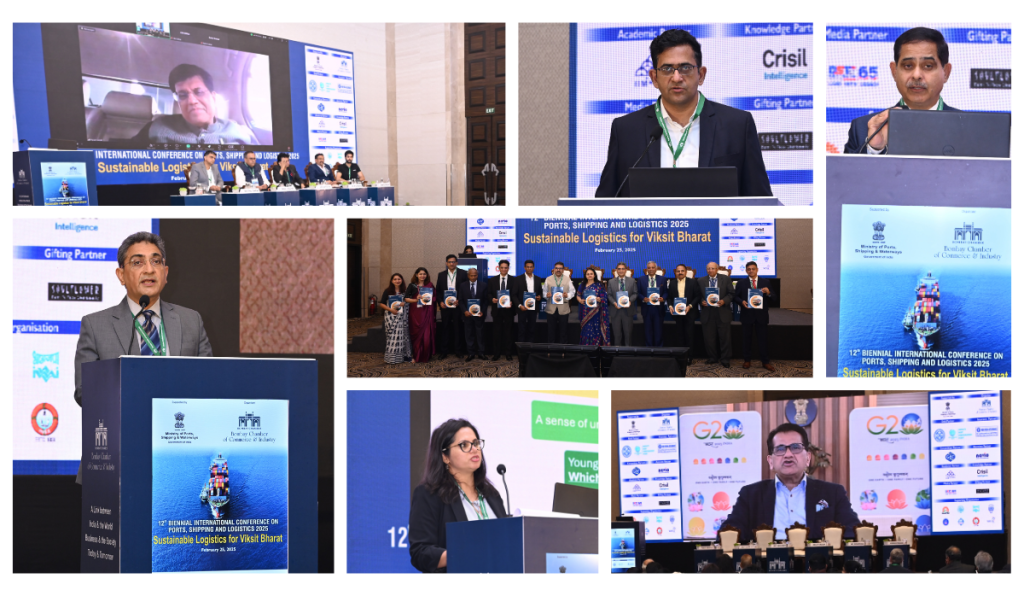
Bombay Chamber, Mumbai: Shipbuilding offers tremendous opportunities in India and it’s an area that private sector shipyards need to focus on. “There is very good business potential in ship-building and the Indian government is also looking at ways to improve the entire ecosystem,” said Hon’ble Union Commerce and Industry Minister Shri. Piyush Goyal.
Shri. Goyal was speaking (via video conferencing) at the 12th Biennial International Conference on Ports, Shipping & Logistics 2025, organised by Bombay Chamber of Commerce and Industry in Mumbai on February 25, 2025.
Seeking inputs from industry stakeholders, Shri. Goyal said, making flagging of vessels in India more attractive is another area where the government would like assistance. “While we have the advantage to allow cabotage, I don’t see many ships getting flagged in India. We can also promote more and more imports coming in on Indian flagged vessels that are permitted within the international trading or WTO trading rules. Sadly, we don’t have enough Indian-flagged vessels to be able to do any of that,” he said.
Shri. Goyal appealed to industry stakeholders to take up the responsibility and guide the government on what needs to be done at the Central or State level to help companies come in with flagged vessels in India. “I understand that financing, leasing and insurance of such vessels is being promoted through the GIFT City already. I wonder if a study has been done of the ecosystem and if it needs further liberalisation, improvisation or amendments, we are happy to look at that as well,” he said.
Training and development of seafarers or merchant navy personnel hold significant potential for job creation in India and globally, said Shri. Goyal. “We’d like the industry to assist in designing and developing a hybrid (online and offline) ecosystem for on-the-job training to increase the number of seafarers in India. The shipping industry has a huge multiplier impact, which we haven’t fully leveraged yet,” he said. He added that container ownership and manufacturing in India, increasing export speeds, and easing port congestion are other crucial areas that need to be looked at as well.
The Indian Ports, Shipping and Logistics industry is a critical component of the country’s economy, facilitating trade and commerce both domestically and internationally. Maritime transport remains the backbone of India’s trade, with around 95% of the country’s trading by volume and 70% by value conducted through this mode. India boasts a coastline of 7,516.6 kilometres, with 12 major and over 200 minor and intermediate ports.
While the sector continues to evolve, driven by significant infrastructure investments, policy reforms, and technological advancements there are several challenges as well. In this regard, the 12th Biennial International Conference on Ports, Shipping & Logistics 2025, organised by Bombay Chamber, attempted to discuss and brainstorm on a variety of topics including geopolitical trends, opportunities and challenges for logistics industry, rail connectivity and multimodal integration for sustainable logistics, driving efficiency through connectivity, future of shipbuilding, strengthening supply chain management, port security and cyber security, women in logistics and, potential of digitalisation among others.
Shri. Rajiv Jalota, Retd. IAS, former chairperson of the Mumbai Port Authority, introduced the conference theme: ‘Sustainable Logistics for Viksit Bharat.’ This theme underscored the industry’s commitment to developing a sustainable and efficient logistics infrastructure that aligns with India’s vision of becoming a developed nation. A strategy report was also unveiled. Jalota explained that the main objective of the conference was to find strategic solutions for improving the efficiency of ‘end-to-end logistics’ in India, with a focus on the customer. Discussions covered areas such as digitisation, connectivity, sustainable logistics, green initiatives, port security, and cyber security in Indian logistics.
Sharing insights from an industry survey, Jagannarayan Padmanabhan, practice head and senior director – Transport, Logistics and Mobility, CRISIL, spoke about a strong pipeline of maritime projects and new ports under development. Among challenges being faced by the industry, he pointed towards issues created by regional political parties, need for sustainable ports and the need for increasing the number of women being employed in the logistics sector.
Need of port connectivity, port lead industrialisation, warehousing and logistics parks were seen by the industry as enablers for ports. CRISIL recommended measures like use of digitalisation, policy support measures, skill development and sustainability as catalysts for the sector’s growth.
In his keynote address, Shri. Amitabh Kant, India’s G20 Sherpa and former chief executive officer, NITI Aayog, discussed opportunities in green shipping technologies, sustainable development and transportation. Shri. Kant highlighted about India being strategically located in the grassroots of international trade, promotion of the blue economy including the Sagarmala Programme. He stressed that government, industry and market players need to work together and unlock the potential of a bright economy.
Shri. Sanjay Swarup, chairman and managing director, CONCOR, talked about the role of Indian Railways in cargo shipment and dedicated freight corridors (DFCs). He said that currently 2,438 kilometres (between EDFC and WDFC) of railway line has been made operational and is dedicated to carrying freight trains. DFCs are designed to be high-capacity and high-speed, and are intended to reduce logistics costs and improve efficiency, he said.
Sharing his perspectives on ‘Sustainable Global Trade: Leveraging Technology for Green Logistics Solutions’, Satya Prasad Sahu, Senior Trade Facilitation Specialist at the World Bank, emphasised the critical importance of supply chain resilience.
Capt. B. K. Tyagi, Chairman and Managing Director of The Shipping Corporation of India, provided insights on the future of shipbuilding in India. He stressed the need to strengthen supply chain management through enhanced design capabilities, technological advancements, skilled labour, low-cost financing, and financial incentives. He also highlighted the importance of Just-In-Time (JIT) with lean management and developing local manufacturing units for major machinery and equipment in collaboration with international original equipment manufacturers (OEMs).
On the topic of women in logistics, Capt. Aakriti Barthwal, QHSE Superintendent, Synergy Navis Marine Pvt. Ltd., talked about making a successful career in the maritime industry while also addressing unique challenges faced by female seafarers.
The conference concluded with a presentation by a group of students from the Indian Institute of Management, Mumbai, who won the Business Case Study competition (Hull Cleaning Challenge). This competition was organised by the Bombay Chamber of Commerce & Industry in collaboration with industry and academia. GAC India served as the competition partner, while IIM, Mumbai participated as the academia partner.
The conference was supported by the Ministry of Ports, Shipping and Waterways. Gold partners included Mumbai Port Authority and Jawaharlal Nehru Port Authority. New India Assurance was the insurance partner, while Navio Shipping Pvt. Ltd. was an associate partner. CRISIL Intelligence served as the knowledge partner, with SOULFLOWER and Daily Shipping Times joining as the gifting and media partners, respectively.
Supporting organisations for the international conference included the Ministry of Ports, Shipping and Waterways, Maharashtra Industry, Trade and Investment Facilitation Cell (Maharashtra, India), Indian Ports Association, Inland Waterways Authority of India (IWAI), Shipping Corporation of India, CHEMEXCIL, SEEPZ, Women’s International Shipping & Trading Association (WISTA), and Indian National Shipowners’ Association.
The conference featured distinguished speakers such as S. Krishnan, IAS, Secretary, Ministry of Electronics & Information Technology (MeitY); Dnyaneshwar Bhalachandra Patil, IAS, Development Commissioner, Santa Cruz Exclusive Export Processing Zone (SEEPZ), Special Economic Zone, Mumbai; P.L. Haranadh, IRTS, Chairperson, Paradip Port Authority; Rajesh Menon, Associate Director, DPIIT, Ministry of Commerce and Industry; Hamdi Osman, Founder and CEO, SolitAir and Rampraveen Swaminathan, MD & CEO, Mahindra Logistics.
The event also saw strong industry participation, with 50% representation from leading companies like Hindustan Unilever Ltd (HUL) and Larsen & Toubro (L&T), among others.
(Write to us at legalipr@bombaychamber.com)
India-Cyprus Business Forum Conclave strengthens Bilateral Trade and Investment Opportunities
India-Cyprus Business Forum Conclave strengthens Bilateral Trade and Investment Opportunities
February 20, 2025: Following the Memorandum of Understanding (MoU) between the Bombay Chamber of Commerce and Industry and the Cyprus Chamber of Commerce and Industry, the Honorary Consul of the Republic of Cyprus in Mumbai organised the Cyprus Business Forum Conclave. The event aimed to strengthen bilateral trade and investment between India and the Republic of Cyprus.
Sandeep Khosla, Director General of the Bombay Chamber of Commerce & Industry, welcomed the gathering and highlighted the Chamber’s role in enhancing trade and commerce between India and Cyprus. He also spoke about the vast history of the Bombay Chamber, the oldest chamber in India.
Delivering the keynote address, H.E. Evagoras Vryonides, High Commissioner of the Republic of Cyprus in India, emphasised the long-standing relationship between Cyprus and India, dating back to the 1950s with the formation of the Non-Aligned Movement (NAM). Now a member of the European Union, Cyprus serves as a gateway to the EU. He highlighted several advantages of doing business in Cyprus, including a low corporate tax rate of 12.5%, ease of doing business, an equitable climate, and strong infrastructure. He also identified key areas for potential cooperation between India and Cyprus, such as tourism, education, IT, sports, and weddings as a growing sector.
Viraj Kulkarni, Honorary Consul of the Republic of Cyprus in Mumbai, spoke about India-Cyprus trade relations and outlined plans to expand Cyprus’s presence in Maharashtra over the next six months. He also mentioned ongoing discussions with Air India to increase flight connectivity to Cyprus, which would further facilitate trade and tourism.
In a video message, H.E Manish, the High Commissioner of India to the Republic of Cyprus highlighted the historical ties between India and Cyprus and their strategic positions at the crossroads of Asia and Europe. He noted that India is the fastest-growing economy in the world, while Cyprus is the second-fastest growing economy in the EU. He emphasised strengthening collaboration through the “4 Ts” framework – Trade, Technology, Talent, and Tourism.
The event also featured presentations from key stakeholders, including:
Cyprus Securities and Exchange Commission
Invest Cyprus on Doing Business in Cyprus.
Cyprus Stock Exchange on Opportunities & New Developments.
Techisland
Cyprus Investment Fund Association, on Cyprus Alternative Investment Fund Industry
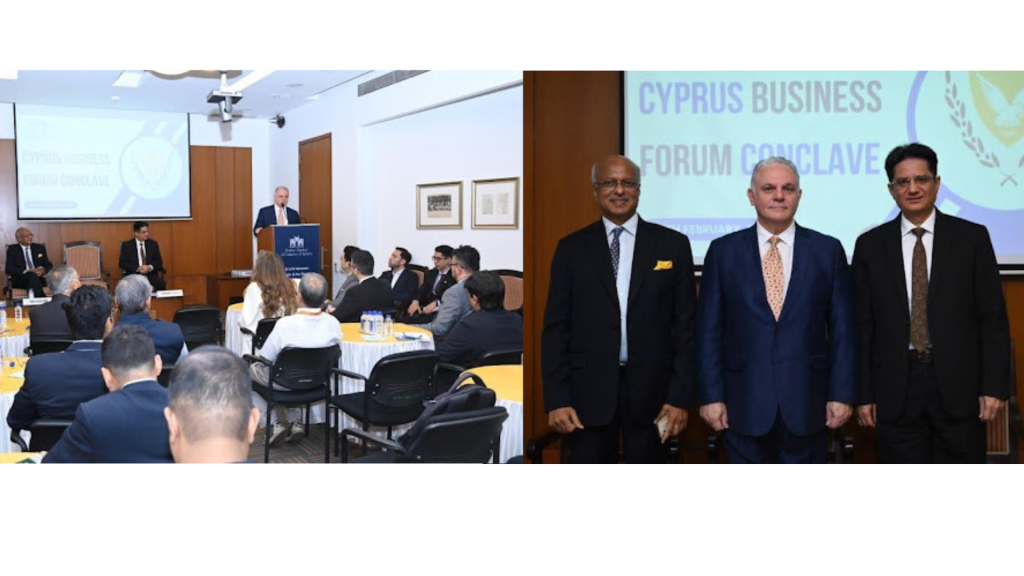
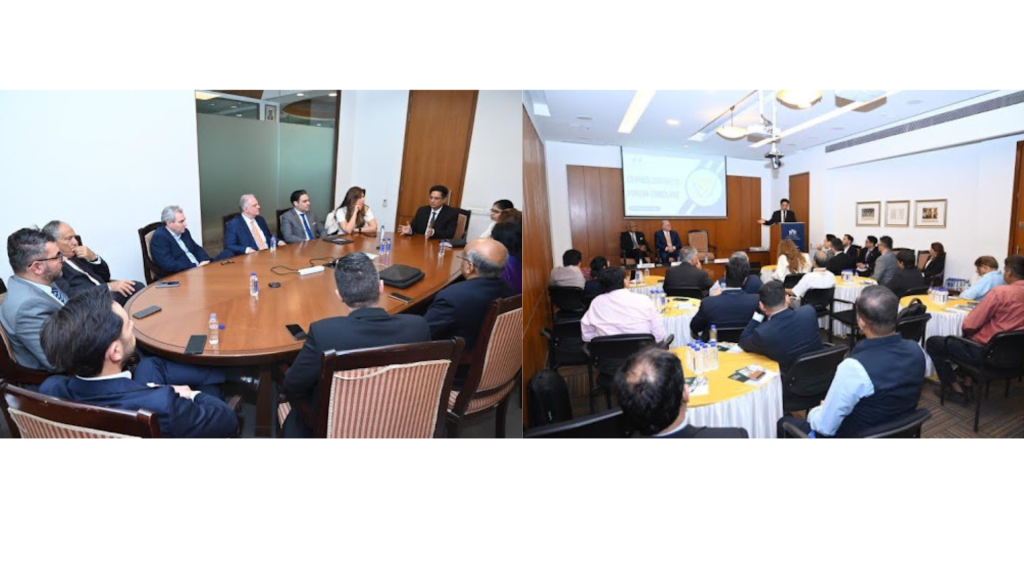
US tariff hike on steel may push surplus to India
US tariff hike on steel may push surplus to India
Bombay Chamber, Mumbai: The direct impact of the US tariffs on India’s steel sector sales volumes is expected to be minimal as India’s direct steel exports to the US accounted for only about 4% of its total steel exports in calendar year 2024 (CY24). However, there could be an indirect impact on realisations if major steel exporters to the US divert their supplies to India.
“The tariff hike by the US may lead to a substantial amount of surplus production being redirected to other countries, notably the Indian market, which is among the fastest-growing globally,” said Hitesh Avachat, associate director, CareEdge Ratings.
Global steel consumption is predicted to decline for the second year in a row in CY24, primarily due to decreased consumption from major developed nations such as the USA, Japan, and European regions. China, which represents nearly half of global steel production and demand, also saw a continued decline in domestic consumption. Despite this, the Chinese steel industry’s capacity utilisation rate remains robust at 80-85%, leading to significant surplus production, estimated at around 90-95 million tonnes (MnT) in CY24 – an increase from approximately 65 MnT previously in CY22, being exported.
India, on the other hand, has experienced strong steel demand growth, averaging around 10-13% over the past three fiscal years (FY22 to FY24). However, the global decline in demand has created an over-supply situation, pressuring steel realisations. Global steel prices have averaged around US$ 535 per tonne in CY24, down from US$ 788 per tonne in CY22, and have further declined in CY25 hovering around US$ 481 per tonne in January 2025.
“Over the past 3-4 quarters, the domestic steel industry has faced margin pressure owing to a significant decline in realisations, influenced by cheaper imports of steel products,” said Avachat adding that this trend may persist due to an increased steel surplus resulting from the recently imposed tariffs by the US.
CareEdge Ratings stated in its report that the US tariffs could result in the diversion of surplus steel production from major Asian steel manufacturers to the Indian market, likely affecting realisations.
During the first 10 months of FY25, the realisations of the domestic steel industry have already moderated with growing imports, making India a net importer of steel compared to a net exporter up to FY24. While overall volume of steel import into India is low compared to total domestic consumption, the realisations tend to mirror the landed cost parity with international prices.
Amid a subdued global environment, Avachat said, growth in Indian steel demand is expected to continue at a compound annual growth rate (CAGR) of around 8% over the next 2-3 years. The growth will be primarily driven by sustained momentum in end-user sectors such as infrastructure and construction.
While the direct impact of US tariffs on India’s steel industry might appear limited, the broader market dynamics suggest a complex scenario. The potential redirection of surplus steel to India could exert downward pressure on domestic prices, challenging Indian manufacturers. Accordingly, strategic planning and market diversification will be crucial for India to navigate these global shifts and sustain its growth trajectory.
(Write to us at legalipr@bombaychamber.com)
Prime Minister addresses the 14th India-France CEOs Forum
Prime Minister addresses the 14th India-France CEOs Forum
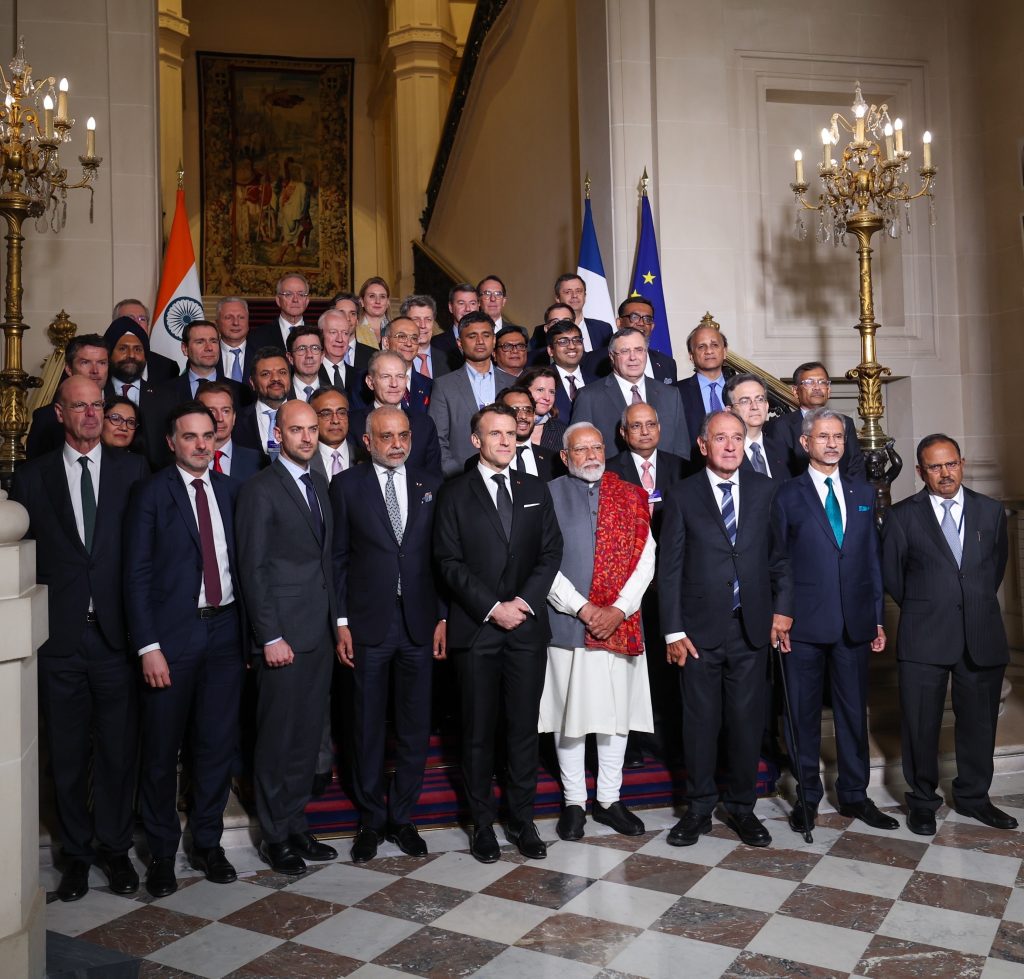
Prime Minister Shri Narendra Modi and the President of France, H.E. Mr. Emmanuel Macron jointly addressed the 14th India-France CEOs Forum today in Paris. The forum brought together CEOs from a diverse group of companies from both sides, focusing on sectors such as defence, aerospace, critical and emerging technologies, infrastructure, advanced manufacturing, artificial intelligence, life-sciences, wellness and lifestyle, and food and hospitality.
Prime Minister in his address noted the expanding India-France business and economic collaboration and the impetus it has provided to the strategic partnership between the two countries. He highlighted India’s attractiveness as a favored global investment destination, based on its stable polity and predictable policy ecosystem. Talking of the reforms announced in the recent budget, PM noted that the insurance sector was now open for 100% FDI and civil nuclear energy sector for private participation with focus on SMR and AMR technologies; customs rate structure was rationalized; and simplified income tax code was being brought in to enhance Ease of Living. Referring to the government’s commitment to continue ushering in reforms, he noted that a high-level committee for regulatory reforms had been constituted to establish trust based economic governance. In the same spirit, more than 40,000 compliances had been rationalized in the last few years.
Prime Minister invited French companies to look at the immense opportunities offered by the India growth story, in the defense, energy, highway, civil aviation, space, healthcare, fintech and sustainable development sectors. Underlining global appreciation and interest in India’s skills, talent and innovation and in its newly launched AI, Semiconductor, Quantum, Critical Minerals and Hydrogen missions, he called upon French enterprises to partner India for mutual growth and prosperity. He outlined the importance of active engagement in these sectors, reaffirming the commitment of both nations to fostering innovation, investment, and technology-driven partnerships. Full remarks of Prime Minister may be seen here
External Affairs Minister Dr. S. Jaishankar, alongside the Minister for Europe and Foreign Affairs of France, H.E. Jean-Noël Barrot, and the Minister of the Economy, Finance, and Industrial and Digital Sovereignty of France, H.E. Eric Lombard also addressed the Forum.
India Energy Week 2025 showcases India’s clean cooking gas model: A blueprint for the Global South
India Energy Week 2025 showcases India’s clean cooking gas model: A blueprint for the Global South
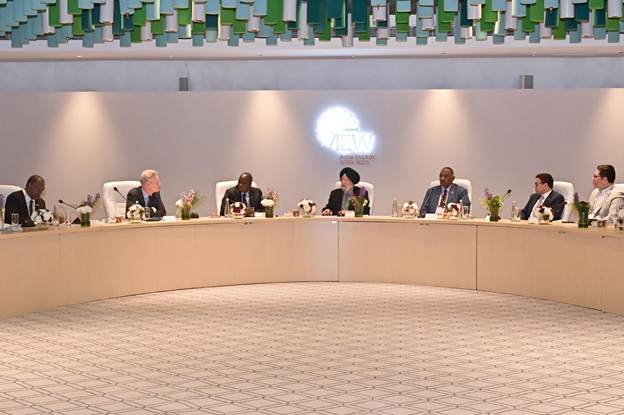
Union Minister of Petroleum and Natural Gas, Shri Hardeep Singh Puri chaired a Ministerial Roundtable on Clean Cooking on the second day of India Energy Week 2025. Shri Puri highlighted India’s remarkable success in ensuring universal access to clean cooking gas through targeted subsidies, strong political will, digitisation of distribution networks by Oil Marketing Companies (OMCs), and nationwide campaigns promoting cultural shifts towards clean cooking.
The session brought together representatives from Brazil, Tanzania, Malawi, Sudan, Nepal, and industry leaders including the International Energy Agency (IEA), Total Energy, and Boston Consulting Group (BCG).
Shri Puri emphasized that India’s model is not only successful but also highly replicable in other Global South nations facing similar energy access challenges. The Union Minister noted that under India’s Pradhan Mantri Ujjwala Yojana (PMUY), beneficiaries receive LPG access at a highly affordable cost of just 7 cents per day, while other consumers can avail themselves of clean cooking fuel at 15 cents per day. This affordability has been a game-changer in driving widespread adoption.
During the discussion, international representatives shared their experiences and challenges in expanding access to clean cooking solutions. Hon. Dkt. Doto Mashaka Biteko, Deputy Prime Minister and Minister of Energy, Tanzania outlined its strategy to enable 80% of households to transition to clean cooking by 2030, leveraging subsidies and a mix of energy sources, including LPG, natural gas, and biogas. However, he acknowledged significant challenges, including financing constraints, the high cost of infrastructure, and the need for regulatory reforms to encourage private-sector participation.
H.E. Dr. Mohieldien Naiem Mohamed Saied, Minister of Energy and Oil, Sudan, emphasised the need for private sector engagement to bridge gaps in LPG supply, as the country still imports a significant portion of its energy needs. Encouraging local cylinder production and ensuring cost-effective imports remain key hurdles in achieving broader adoption. Representatives of Rwanda and Nepal shared their efforts in reducing firewood dependency through electric stoves and biogas expansion.
Mary Burce Warlick, Deputy Executive Director of IEA noted that India’s success offers valuable lessons for other countries, particularly in tackling challenges related to affordability, access, and infrastructure. She further emphasised the role of concessional financing and public-private partnerships (PPP) in expanding clean cooking access globally. Addressing cultural acceptance and regulatory adjustments, such as tax reductions, were also highlighted as crucial measures for large-scale adoption.
Rahool Panandiker, Partner at Boston Consulting Group (BCG) highlighted India’s clean cooking transformation, underscoring its strong political commitment, effective subsidy targeting, and robust public awareness campaigns. He further credited India’s Oil Marketing Companies (OMCs) for enabling last-mile LPG delivery through digital platforms, making adoption seamless. Panadiker also underscored the need for refining the cylinder refill model to ensure sustained usage and balancing affordability with economic sustainability.
Responding to the potential of solar cookers in expanding clean cooking technologies across the Global South, Shri Puri highlighted that IOCL’s advanced solar cookers, featuring integrated solar panels, are priced at approximately $500 per unit with no additional costs over their lifecycle. The Union Minister added that while the current price point remains a challenge for widespread adoption, leveraging carbon financing and collaborating with the private sector could drive costs down, making solar cooking a viable alternative for millions.
This initiative aligns with India’s broader efforts to diversify clean cooking options beyond LPG, reinforcing the country’s commitment to reducing reliance on traditional biomass fuels and cutting carbon emissions.
Shri Puri concluded the discussion by reaffirming India’s commitment to supporting energy access initiatives worldwide. He underscored that the Indian model, backed by smart subsidies and sustainable policies, provides a scalable solution for other developing nations striving to achieve clean cooking access. He stressed that achieving universal clean cooking access is not merely an economic imperative but a moral one, given the severe health and environmental impacts of traditional biomass cooking.
This roundtable reaffirmed India’s position as a global leader in energy transition and clean cooking solutions, setting the stage for greater international cooperation in achieving universal access to clean energy.
Bombay Chamber Hosts Post-Budget 2025-26 Webinar: An Economic Perspective
Bombay Chamber Hosts Post-Budget 2025-26 Webinar: An Economic Perspective
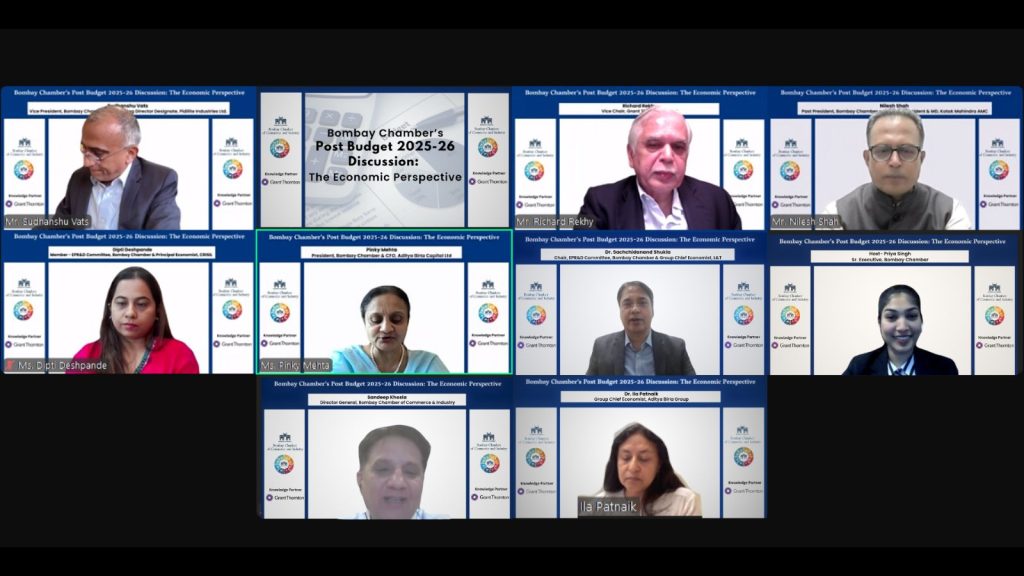
Mumbai, February 4, 2025 – The Bombay Chamber of Commerce & Industry, under the aegis of its Economic Policy Research & Development (EPR&D) Committee hosted a post-budget discussion on the economic perspective following the Union Budget 2025-26, presented by Finance Minister Nirmala Sitharaman on February 1, 2025.
The webinar commenced with a welcome address by Pinky Mehta, President of the Bombay Chamber and CFO of Aditya Birla Capital Ltd., who highlighted the budget’s focus on strengthening private sector investments, boosting household sentiment, and enhancing middle-class purchasing power. She noted that Finance Minister Sitharaman reaffirmed the government’s commitment to inclusive growth through targeted initiatives for the poor, youth, farmers, and women, while also underscoring MSMEs as the “second engine” of the economy. Key budget highlights included the Prime Minister Dhan-Dhaanya Krishi Yojana, which aims to enhance agricultural productivity across 100 districts, and the announcement of five National Centres of Excellence for skilling, supporting India’s ambition to become a global manufacturing hub.
The panel discussion, moderated by Dr. Sachchidanand Shukla, Chair of the EPR&D Committee at the Bombay Chamber and Group Chief Economist at L&T, featured distinguished experts, including Dr. Ila Patnaik, Group Chief Economist at Aditya Birla Group; Nilesh Shah, Past President of the Bombay Chamber and Group President & MD at Kotak Mahindra AMC; Sudhanshu Vats, Vice President of the Bombay Chamber and Managing Director Designate at Pidilite Industries.; Dipti Deshpande, Principal Economist at CRISIL; and Richard Rekhy, Vice Chair at Grant Thornton Bharat.
Discussions focused on tax reforms, economic growth, fiscal discipline, and global trade. Shah highlighted the need for better tax compliance and expressed optimism for a more favourable tax regime in the coming years. Deshpande noted that despite tax relief measures, income tax collections are projected to grow by 20.6 percent, driven by structural changes, compliance, and digitalisation. She also highlighted the government’s commitment to fiscal prudence, noting that the fiscal deficit has been reduced to 4.4 percent and remains on track to fall below 4.5 percent in 2025-26. Revenue spending cuts, strong tax collections, and PSU dividends are key drivers of this fiscal consolidation, reinforcing India’s long-term economic stability.
Dr. Patnaik stressed the importance of removing the inverted duty structure to create a level playing field for Indian industries and noted that policy changes are advancing the Make in India initiative. Vats described the budget as balanced and forward-looking, citing the one lakh crore rupees tax rebate as a bold move to stimulate middle-class consumption and drive growth in manufacturing, services, and GST revenues. Addressing global trade concerns, Shah emphasised the need for India to engage in strategic partnerships to avoid negative impacts from ongoing trade tensions.
Rekhy pointed out that while middle-class spending is rising, challenges such as food inflation, underemployment, and regulatory complexities persist. He highlighted the importance of skilling initiatives to support India’s goal of becoming a global talent hub.
The panellists agreed that the Union Budget 2025-26 maintains a strong balance between fiscal prudence and economic growth, with continued policy implementation and regulatory reforms being key to sustaining long-term stability.The session concluded with a vote of thanks by Sandeep Khosla, Director General of the Bombay Chamber.


It is a long established fact that a reader will be distracted by the readable content of a page when lookin







